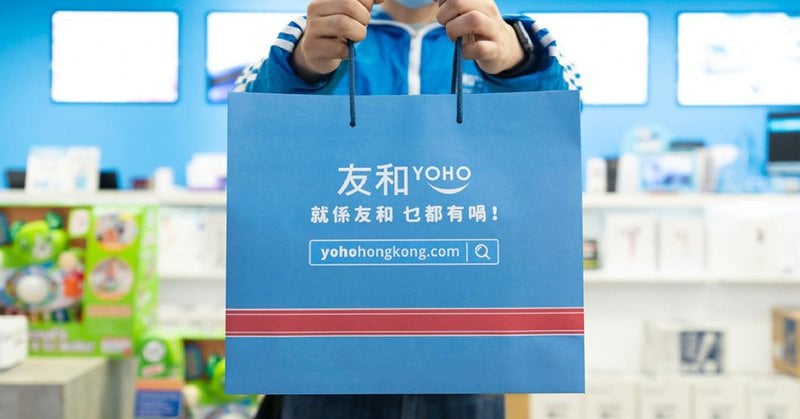Goals
- Provide equal attention to inquiries on all channels
- Improve management of the variety of support conversations
- Reduce losing sales to competitors due to poor support
- Improve response and resolution times
Solutions
- Consolidate all channels on one messaging platform
- Create separate Workspaces for key inquiry categories
- Recover sales opportunities with timely and smart support
- Access data and analytics that identify support weak points
Yoho pioneered Hong Kong’s e-commerce landscape when it began selling consumer electronics and home appliances in 2013. Today, it’s among the largest e-commerce platforms in the region in terms of website traffic and online sales in its category. Yoho conquered 5.6% of the market share in 2020/2021 with demand from customers in Hong Kong and mainland China predominantly.
The company also has three retail locations in Kowloon and Hong Kong Island, which account for 20% of its total sales. Its online-merge-offline (OMO) model expands business opportunities in both markets and offers customers enjoyable shopping experiences in both worlds.
The Problem
Initially, Yoho mostly focused on handling inquiries over web chat, its most popular support channel among customers. As a result, inquiries on channels like WhatsApp and WeChat were sometimes neglected. It approached respond.io for a central inbox to handle chats on both apps for improved response times.
However, Yoho and respond.io rapidly deepened their collaboration as the business grew. Handling a higher volume of inquiries on six messaging channels was challenging. In addition to centralizing its channels, Yoho also wanted to make data-driven decisions to reduce response times and improve the support experience.
The respond.io Solution
As very few business messaging platforms support WeChat integrations, Yoho approached respond.io for an all-in-one solution to its messaging challenges.
Conversations on All Channels were Directed to a Single Inbox
Yoho’s support team dedicated most of their time and attention to web chat, where it receives the bulk of customer inquiries. Other support channels like WeChat, WhatsApp, Instagram, Facebook Messenger and email were only sporadically checked, which delayed replies.
Yoho upgraded its WhatsApp Business App account to WhatsApp API. It connected WhatsApp API and WeChat to respond.io so conversations on both channels flow into a single inbox for easier tracking and follow-ups. Yoho then connected all remaining channels, even switching its web chat from a different provider to respond.io.
In addition to offering omnichannel support on one platform, respond.io facilitates the ability to recognize returning customers on any channel and have their full context ready for reference.
The shortened response time prevents customers from sending duplicated inquiries across channels when impatient for a response. Agents address all inquiries systematically and no longer waste time on duplicate conversations.
Separate Workspaces were Created for Core Support Categories
Initially, all nature of inquiries flooded the various channels. For better conversation management and more precise performance tracking, Yoho created three Workspaces on respond.io.
Each Workspace handles a specific conversation category: General inquiries, warranties and after-sales support for appliance installations. Each Workspace also has its own channels, including a dedicated WhatsApp number for after-sales service to send customers template messages to set installation appointments.
Automation Enables Faster Resolutions in Customers’ Preferred Languages
To improve resolution times, Yoho automated responses to common general inquiries on web chat, WhatsApp and WeChat with respond.io’s Workflows automation builder.
First, customers on any channel select their preferred language from an inquiry menu. Yoho provides support in English as well as traditional and simplified Chinese to cater to different language needs.
Customers then select an inquiry category. Common inquiries follow a self-service route with automated FAQs or redirects to relevant sections on its website. More complex issues are routed and assigned to support agents, who are all fluent in all three languages.
Sales Opportunities are Recovered and Boosted via Support
At any given time, Yoho has over 20,000 SKUs (stock keeping units) in its inventory. When an item was out of stock, customers would inquire about availability or restocks. Delayed responses often translated to lost sales as customers would turn to competitors.
Now, agents promptly recommend alternative products and share relevant promotions to encourage purchases. For instance, customers who spend HK$400 and above on a single receipt enjoy additional discounts or special offers.
When agents inform them about this, customers nearing that amount are likely to add more items to their carts to qualify for the offer.
Support Weaknesses are Pinpointed with Analytics
Yoho wanted to radically improve response and resolution times. However, it lacked a broad view of conversation trends and agent performance. Its data was scattered across messaging platforms or limited to the few metrics offered by its original web chat provider.
With respond.io, managers have granular insights and overviews of agents’ or team performance. As agents’ workloads are updated in real time, managers can allocate additional resources if necessary.
Long-term trend reports on peak support hours, conversation types and response and resolution times enable managers to pinpoint areas of improvement and restrategize for improved performance.
“E-commerce accounts for about 80% of total sales so offering a high standard of customer service online was crucial for us. Respond.io helps us enhance our service quality across all support channels, from email and web chat to our customers’ favorite messaging apps. We appreciate its user-friendly automation and the ability to measure performance with a high level of granularity for the first time. This allows us to take concrete steps to improve our outcomes.” — Tetsu Ho, Technical Product Manager at Yoho Hong Kong.

The Results
With all conversations consolidated on respond.io, customer inquiries no longer go unnoticed. Separate Workspaces also allow Yoho to better manage its channels and monitor the performance of individual teams.
Response times on messaging apps used to span 24 to 48 hours. First response times across all channels now average 5 hours and 43 minutes, approximately 84% faster than the former median response time of 36 hours.
Meanwhile, automating its FAQs allows the support team to focus only on urgent or complex support issues. It now chalks an average resolution time of 11 hours, down from 16 hours. Quick and efficient customer service inspires customer loyalty and repeat service use. In the span of four months, Yoho has seen a 9% growth in members.
Yoho is now looking into sending promotional broadcasts to customers and automating abandoned cart recoveries as the next steps in its respond.io journey.






































 Electronics
Electronics Fashion & Apparel
Fashion & Apparel Furniture
Furniture Jewelry and Watches
Jewelry and Watches
 Afterschool Activities
Afterschool Activities Sport & Fitness
Sport & Fitness
 Beauty Center
Beauty Center Dental Clinic
Dental Clinic Medical Clinic
Medical Clinic
 Home Cleaning & Maid Services
Home Cleaning & Maid Services Photography & Videography
Photography & Videography
 Car Dealership
Car Dealership
 Travel Agency & Tour Operator
Travel Agency & Tour Operator






